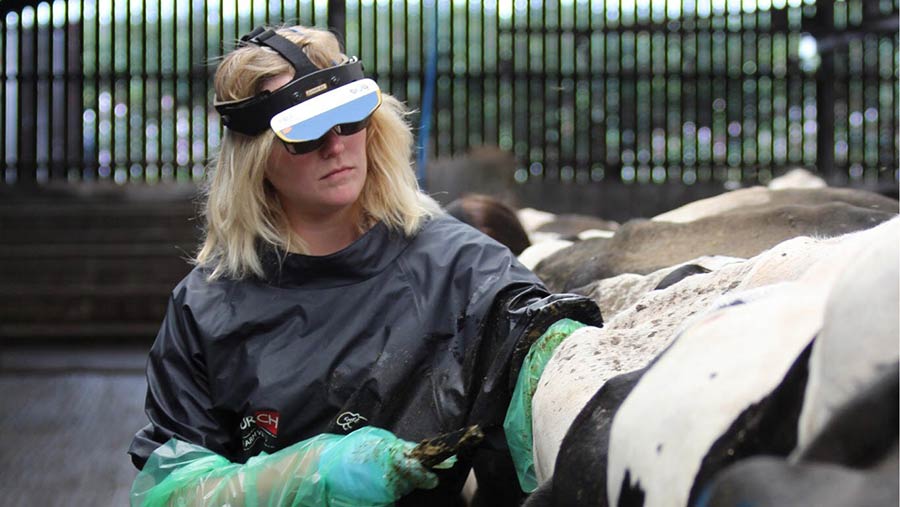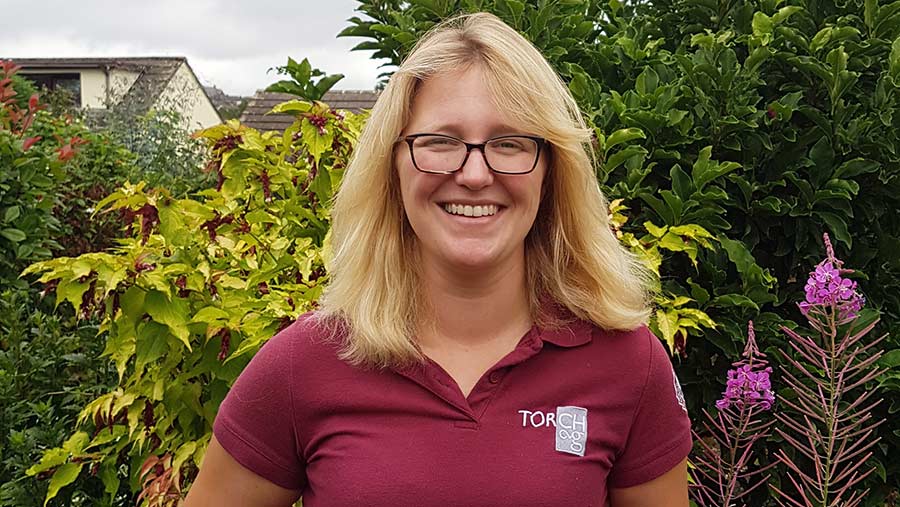Job profile: What’s it like to be a farm vet?
 Farm vet Rebecca Cavill
Farm vet Rebecca Cavill If you love being outdoors and want to help farmers on a daily basis then becoming a farm vet could be a perfect job for you.
Farmers Weekly asked farm vet Rebecca Cavill to give some insight into her role.
See also: More job profiles and agriculture careers advice
Fact file
- Name Rebecca Cavill
- Age 31
- Job Title Veterinary Assistant
- Company Torch Farm Vets
Sum up your job
I work as a farm vet in north Devon. I get to spend a large proportion of my day in the countryside enjoying the sunshine (or rain).
What does your job entail day to day?
The great thing about my job is that it’s so varied. I could be scanning cows to check for pregnancies, disbudding goats, blood-sampling sheep, teaching students or even getting my hands dirty in a bit of surgery or calving a cow.
What do you enjoy the most?
Getting to know a farm and becoming part of the team. Our clients generally like us to be proactive and involved with what’s going on and it’s great to hear that you’ve helped influence changes.
I have always enjoyed putting the pieces of the puzzle together to form a picture of an animal – it’s so satisfying working out what is wrong with an animal then rectifying it.
What’s the downside?
Out-of-hours can be rewarding, but it’s difficult to pretend that you love it when the phone rings at 2am for a calving in a field in the rain. Oh, and TB testing.
What percentage of your job is office based?
With data being more available and better recorded, the office-based element is increasing.
That said, you can’t beat going out and looking at what is puzzling you, so when you’re health planning or trying to solve health problems, you still get to go out on farm and look at what is going on.
With emails, health plans and reports, about 15% of my time is spent in the office, with the rest spent driving about or on farm.
What skills/qualifications are essential to the job?
Good communication is key. Being able to build a relationship and gain trust is very important as clients are putting their livelihood in your hands and need to know that they can rely on you to make the right decisions and implement the correct actions.

Farm vet Rebecca Cavill
What experience did you have before you started?
Places for vet school are grade-dependant, so you need top grades in science and maths subjects to get in.
However, work experience in veterinary-related fields is very much valued, whether this is on farm, in a practice or even in a cattery or zoo, just as long as you have shown you are keen to get involved and learn.
During the five-year course, there is a mandatory amount of weeks that need to be spent on farm, in equine yards and in practice before you are allowed to qualify.
I studied in London and some of my friends doubted that, as a girl from the West Country, I’d survive in the city. But I really enjoyed life in the capital – although Devon is beautiful and I love living here now.
What advice would you give to someone wanting a similar role?
Be prepared for long hours and finding yourself on call for the one night that everyone else is at the pub.
Make sure you have a good support network, especially when you start out – those first few months are quite stressful as you learn how to handle cases and clients.
A wise man once told me: “Don’t take a job with the flat above the practice and make sure you always make the nurses and receptionists a good cup of tea.”
Remember you may need to work your way up, so gaining as much experience as you can when you’re staring out will give you a more complete understanding of the job and benefit you as your career progresses.
Give us an idea of salaries
A recent survey by the Society of Practising Veterinary Surgeons suggested that graduate salaries start from about £32,000 and this could include accommodation and a car if it includes on-call.
Salaries are greatly influenced by location, type of practice, experience or level of expertise. If you want to make super money, you need to become the Bionic Vet – preferably in a London suburb.

